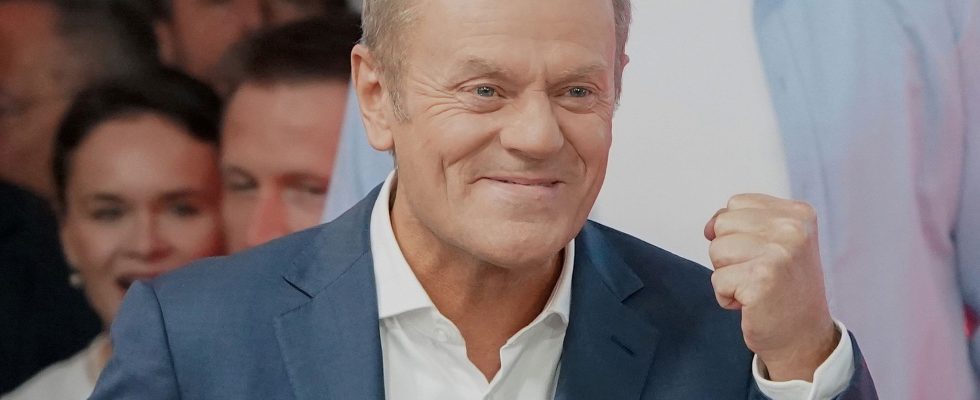“It’s the end of this bad period, it’s the end of PiS’s reign.” It is with great emotion that Donald Tusk, the leader of the main Polish opposition party, the Civic Coalition (KO), announced on Sunday evening the opening of a new chapter for his country. “Poland won, democracy won, we chased them from power,” added the former Prime Minister (2007-2014) and President of the European Council (2014-2019), in reference to the numerous rights violations fundamentals of the outgoing government, in particular reforms undermining the independence of the judicial system.
Certainly, the Law and Justice party (PiS), in power for eight years, finished first in the legislative elections for the third time in a row. But with 10% fewer seats, this populist movement does not seem able to form a government, as it hoped, with the far-right Confederation. Facing them, the liberals have an absolute majority, combining the results of the KO, the Left and the Third Way Christian Democrats (248 seats out of 460 according to the Ipsos institute, including 161 for the KO).
“Donald Tusk won his bet, his strategy of appearing on the front line paid off, it is also a personal success for him, notes Anna Paczesniak, professor at the department of European studies at the University of Wroclaw. And in the end of the campaign, after the march of a million people on October 1, he skillfully recalled that, more than a useful vote for the KO, it was necessary for all opposition parties to exceed the threshold of 8% of votes necessary to obtain seats, and therefore that voters had to vote with the heart.”
A new era is dawning in Poland, although it will take several weeks before a new government is formed. President Andrzej Duda should first appoint a representative of the PiS, which came first, as prime minister, so that he can try to form a government. The turn of the liberals – hated by the ultraconservatives, starting with Donald Tusk himself – will only come once this attempt has failed in Parliament.
Peaceful relations with Brussels
It is feared that the conservatives will try to maneuver to complicate any transfer. “PiS will likely remain in power at least until mid-December as an interim government, with full control over state institutions,” notes Piotr Buras, director of the Polish office of the European Council on International Relations. The real test will be, at the end of the year, whether and how power will pass to a new government.”
The PiS government’s breaches of the rule of law are currently depriving Poland of a post-Covid European investment plan of 35 billion euros, while its economy is undermined by inflation and rising debt. Its unblocking by the Commission will be the priority of Prime Minister Donald Tusk, determined to pacify relations between Warsaw and Brussels. “The main immediate objective of the new government will be to remove PiS members from public institutions, public companies and public television [transformé en organe de propagande par le PiS]”, insists Piotr Buras.
The review of judicial reform will be a key point of the new period which is beginning. The Court of Justice of the European Union is demanding that Poland put an end to the activities of the disciplinary chamber of the Supreme Court. Created by the ultraconservatives, this allows them to remove certain independent judges, with the help of senior magistrates appointed by the PiS in exchange for a form of allegiance. In terms of law, the liberals should also quickly return to the tightening of access to voluntary termination of pregnancy, authorized only in cases of rape, incest and danger to the life or health of the mother or of the child.
A liberal government could, however, encounter difficulties, even if it has a majority in Parliament. “President Andrzej Duda [proche du PiS, en poste jusqu’à mi-2025] can veto each legislative text and the new executive will not have the three-fifths majority necessary to override its veto, fears Piotr Buras. Moreover, it will often be impossible to reverse PiS reforms without making decisions that border on legality.” For Donald Tusk, the hardest part remains to be done.
